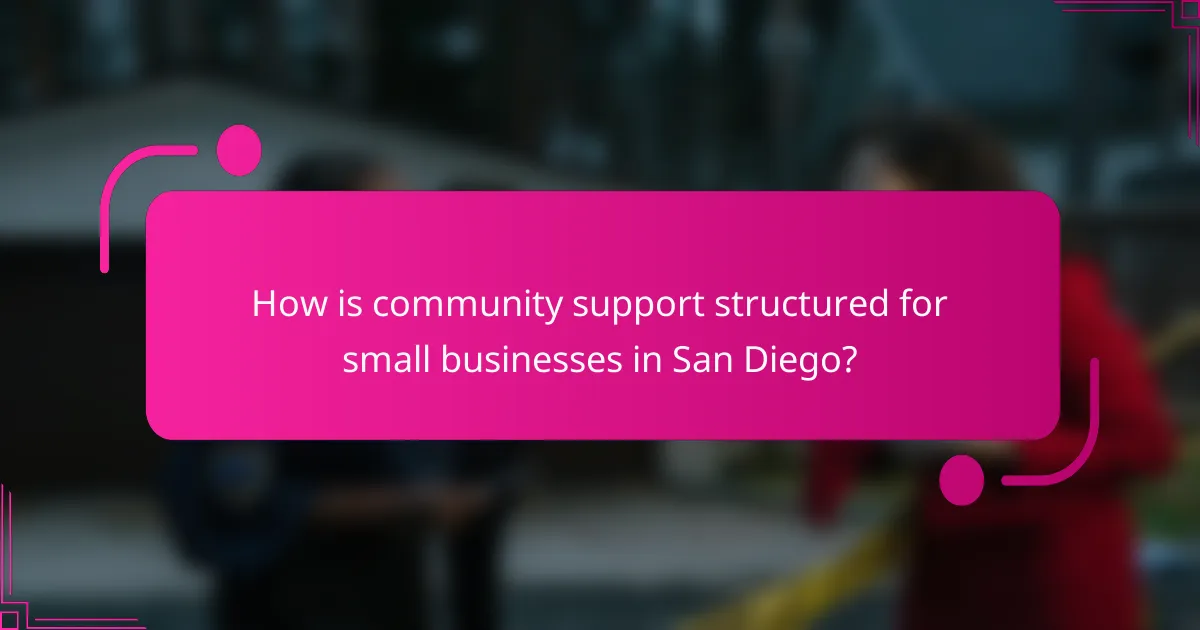
What is the San Diego Small Business Landscape?
The San Diego Small Business Landscape refers to the ecosystem of small enterprises operating within San Diego. This landscape is characterized by a diverse range of industries, including technology, tourism, and retail. According to the U.S. Small Business Administration, small businesses make up 99.8% of all California businesses. In San Diego, these businesses employ approximately 50% of the workforce. The city offers various resources and support systems for small businesses, including local chambers of commerce and business development centers. Challenges such as competition, access to funding, and regulatory hurdles are prevalent. However, opportunities for growth exist through innovation and community collaboration. Overall, the San Diego small business landscape is dynamic and vital to the local economy.
How does the small business landscape in San Diego compare to other regions?
The small business landscape in San Diego is characterized by a diverse economy and a strong entrepreneurial spirit. Compared to other regions, San Diego has a higher concentration of tech startups and biotech firms. The city benefits from a favorable climate and a skilled workforce, enhancing its attractiveness for small businesses. Additionally, San Diego’s proximity to the Mexican border fosters cross-border trade opportunities.
However, challenges such as high rental costs and competition from larger corporations persist. According to the U.S. Small Business Administration, San Diego has a small business growth rate of 2.3%, slightly above the national average of 2.1%. This indicates a robust environment for small enterprises relative to other regions. Overall, San Diego’s small business ecosystem is vibrant yet faces unique local challenges.
What are the key characteristics of small businesses in San Diego?
Small businesses in San Diego are typically characterized by their local focus and community engagement. They often serve niche markets, catering to specific customer needs. Many small businesses in the area emphasize sustainability and environmentally friendly practices. A significant number are involved in the tourism and hospitality sectors, given San Diego’s coastal location. These businesses frequently rely on innovative marketing strategies to compete with larger corporations. Additionally, they often face challenges such as high rent and competition for skilled labor. According to the Small Business Administration, small businesses make up 99.8% of all California businesses, highlighting their importance to the local economy.
What role do small businesses play in San Diego’s economy?
Small businesses are vital to San Diego’s economy. They contribute significantly to job creation, employing over 200,000 individuals. Small businesses account for approximately 98% of all businesses in the region. They drive innovation and foster competition, enhancing the local market. In 2020, small businesses generated around $22 billion in revenue. This revenue supports local communities and promotes economic growth. Furthermore, small businesses often engage in community initiatives, strengthening social ties. Their adaptability allows them to respond quickly to market changes, ensuring economic resilience.
What challenges do small businesses in San Diego face?
Small businesses in San Diego face several challenges. High rental costs are a significant issue, with commercial real estate prices among the highest in the nation. Limited access to funding also hinders growth, as many small businesses struggle to secure loans. Additionally, regulatory compliance can be burdensome, with various local and state regulations to navigate. Competition from larger corporations poses another challenge, as they often have more resources. Moreover, the ongoing impacts of economic fluctuations affect consumer spending. Lastly, workforce shortages complicate hiring, particularly in specialized industries. These factors collectively create a challenging environment for small businesses in San Diego.
How do economic factors impact small businesses in San Diego?
Economic factors significantly impact small businesses in San Diego. These factors include local economic growth, employment rates, and consumer spending. In recent years, San Diego has experienced a strong economy, which boosts small business revenues. According to the San Diego Regional Economic Development Corporation, the unemployment rate in San Diego was 4.2% in 2022, supporting a favorable environment for small businesses. Additionally, higher disposable income levels in the region lead to increased consumer spending. This trend enables small businesses to thrive and expand. Conversely, economic downturns can lead to reduced sales and financial strain. Overall, economic factors play a crucial role in shaping the success and sustainability of small businesses in San Diego.
What regulatory challenges are unique to San Diego small businesses?
San Diego small businesses face unique regulatory challenges including strict zoning laws. These laws can limit where businesses can operate based on location and type. Additionally, small businesses must navigate complex permitting processes. This can delay opening and increase costs. Environmental regulations also impact various industries, particularly in coastal areas. Compliance with these regulations can be costly and time-consuming. Labor laws specific to California add another layer of complexity. These laws often require businesses to provide additional benefits compared to other states. Finally, local health and safety regulations can vary significantly across neighborhoods. This inconsistency can create confusion for small business owners.
What opportunities exist for small businesses in San Diego?
Small businesses in San Diego have various opportunities for growth and development. The city’s thriving tourism sector provides a steady customer base. Additionally, San Diego’s diverse economy supports industries like technology, healthcare, and defense. The local government offers grants and resources to encourage entrepreneurship. Networking events and business incubators foster collaboration among small business owners. San Diego’s proximity to Mexico allows for cross-border trade opportunities. Furthermore, a growing focus on sustainability opens avenues for eco-friendly businesses. The city’s vibrant startup ecosystem is supported by investors and venture capital. These factors collectively create a favorable environment for small businesses to flourish.
How can local trends benefit small businesses in the area?
Local trends can significantly benefit small businesses by aligning their offerings with community preferences. When businesses adapt to local trends, they increase customer engagement. This leads to higher sales and brand loyalty. For instance, a 2021 survey indicated that 70% of consumers prefer to shop at businesses that reflect local culture. Additionally, businesses that participate in local events can enhance visibility and attract new customers. This strategy fosters community support and collaboration, driving growth. By leveraging local trends, small businesses can effectively differentiate themselves in a competitive market.
What support systems are in place to encourage small business growth?
Various support systems are in place to encourage small business growth in San Diego. These include local government initiatives, financial assistance programs, and community organizations. The San Diego Small Business Development Center offers free business consulting and training. Additionally, the city provides grants and loans through programs like the Small Business Relief Fund. Networking opportunities through chambers of commerce facilitate connections among local entrepreneurs. Resources such as SCORE provide mentoring from experienced business professionals. Furthermore, incubators and accelerators foster innovation and growth for startups. These systems collectively create a robust ecosystem for small businesses to thrive.

How is community support structured for small businesses in San Diego?
Community support for small businesses in San Diego is structured through various initiatives and organizations. Local chambers of commerce provide networking opportunities and resources. Nonprofit organizations offer grants and mentorship programs. The city government supports small businesses with funding and regulatory assistance. Community events promote local shopping and engagement. Additionally, social media campaigns encourage residents to support local enterprises. These efforts collectively aim to strengthen the local economy and foster a sense of community among business owners and consumers.
What organizations provide support to small businesses in San Diego?
Organizations that provide support to small businesses in San Diego include the San Diego Small Business Development Center (SBDC) and the San Diego Chamber of Commerce. The SBDC offers free business consulting and low-cost training programs. They assist with business planning, funding, and marketing strategies. The San Diego Chamber of Commerce advocates for small businesses and provides networking opportunities. They also offer resources for business growth and development. Additionally, the City of San Diego Economic Development Department supports local businesses through various programs and funding opportunities. The California Small Business Administration (SBA) also provides loans and grants specifically for small businesses in the region.
How do local chambers of commerce assist small businesses?
Local chambers of commerce assist small businesses by providing networking opportunities, resources, and advocacy. They organize events that connect business owners with potential clients and partners. These chambers offer workshops and training sessions to enhance skills and knowledge. They also provide access to valuable market research and industry insights. Additionally, chambers advocate for local businesses at the municipal and state levels. They help businesses navigate regulations and access funding opportunities. According to the U.S. Chamber of Commerce, businesses that engage with their local chamber report increased visibility and growth.
What role do non-profits play in supporting small businesses?
Non-profits play a crucial role in supporting small businesses. They provide resources, funding, and networking opportunities. Many non-profits offer grants to help small businesses start or expand. For example, the San Diego Foundation has initiatives specifically aimed at local entrepreneurs. Non-profits also host workshops and training sessions. These programs enhance business skills and knowledge. Additionally, they connect small businesses with mentors and industry experts. This guidance can lead to better business practices and increased success. Non-profits often advocate for small businesses at local government levels. This advocacy helps shape policies that benefit the small business community. Overall, non-profits are essential partners for small businesses in San Diego.
How does community engagement impact small businesses?
Community engagement significantly impacts small businesses by fostering customer loyalty and enhancing brand visibility. Engaged communities are more likely to support local businesses through patronage. A study by the American Express indicates that 70% of consumers prefer to shop locally when they feel a connection to the community. Additionally, community involvement can lead to increased word-of-mouth referrals, which are crucial for small business growth. Engaging with local events and initiatives can also improve a business’s reputation. This positive perception can attract new customers and retain existing ones. Overall, community engagement serves as a vital strategy for small businesses to thrive in competitive markets.
What are the benefits of community partnerships for small businesses?
Community partnerships provide several benefits for small businesses. They enhance local visibility and reputation. Collaborating with other organizations fosters trust within the community. Partnerships can lead to shared resources, reducing costs for small businesses. They also create networking opportunities, connecting businesses with potential customers and partners. According to a survey by the Small Business Administration, 70% of small businesses report increased sales through community engagement. Additionally, community partnerships can drive local economic growth, benefiting both the business and the community.
How can small businesses leverage local events for growth?
Small businesses can leverage local events for growth by increasing visibility and building community connections. Participating in local events allows businesses to showcase their products and services to a wider audience. Engaging with attendees can foster relationships and enhance brand loyalty. According to a study by the Event Marketing Institute, 84% of consumers say they value in-person interactions. This demonstrates the importance of face-to-face engagement for small businesses. Additionally, local events often attract media coverage, providing free publicity. Collaborating with other local businesses during events can create synergies and expand networks. By strategically aligning with community interests, small businesses can enhance their relevance and appeal.

What are the best practices for navigating the San Diego small business landscape?
To navigate the San Diego small business landscape effectively, entrepreneurs should prioritize networking and community engagement. Building relationships with local business organizations can provide valuable resources and support. Utilizing platforms like the San Diego Regional Chamber of Commerce can enhance visibility and connections. Understanding local regulations is crucial; compliance with city and state laws ensures smooth operations. Additionally, leveraging digital marketing strategies can help reach a broader audience. Research shows that small businesses engaging in community events see a 30% increase in customer loyalty. Finally, seeking mentorship from established business owners can offer insights and guidance tailored to the local market.
What strategies can small businesses use to overcome challenges?
Small businesses can use various strategies to overcome challenges. Effective financial management is crucial. This includes budgeting, monitoring cash flow, and reducing unnecessary expenses. Building a strong online presence helps attract customers. Utilizing social media and an optimized website can enhance visibility. Networking with other businesses fosters collaboration and support. Joining local business associations provides resources and advocacy. Adapting to market changes is essential for survival. This can involve diversifying products or services based on customer feedback. Investing in employee training improves service quality and efficiency. According to the Small Business Administration, effective strategies can significantly enhance resilience and growth in challenging times.
How can small businesses effectively network within the community?
Small businesses can effectively network within the community by participating in local events and organizations. Engaging in community events helps build relationships with potential customers and other businesses. Joining local chambers of commerce provides access to networking opportunities and resources. Collaborating with other small businesses on joint promotions can enhance visibility and reach. Utilizing social media platforms allows businesses to connect with the community and share updates. Hosting workshops or seminars can position businesses as industry experts and attract local interest. Research shows that 70% of small businesses find networking essential for growth. Effective networking fosters trust and loyalty, crucial for long-term success.
What resources are available for financial assistance for small businesses?
Financial assistance resources for small businesses include grants, loans, and support programs. The Small Business Administration (SBA) offers various loan programs like the 7(a) Loan and the CDC/504 Loan. Local organizations, such as the San Diego Small Business Development Center, provide guidance and access to funding. Additionally, the California Governor’s Office of Business and Economic Development offers grants and resources. Nonprofit organizations also provide funding opportunities tailored to specific industries. These resources collectively aim to support small businesses in navigating financial challenges and fostering growth.
What tips can help small businesses thrive in San Diego?
Small businesses in San Diego can thrive by leveraging local resources and community support. Engaging with the San Diego Chamber of Commerce can provide networking opportunities. Utilizing social media platforms effectively can enhance visibility and customer engagement. Participating in local events helps build community relationships and brand awareness. Accessing small business grants and funding programs can provide crucial financial support. Collaborating with other local businesses fosters partnerships and shared resources. Focusing on customer service can lead to repeat business and positive word-of-mouth. Lastly, staying informed about local regulations and market trends is essential for adaptability and growth.
How can small businesses adapt to changing market conditions?
Small businesses can adapt to changing market conditions by implementing flexible strategies. They should regularly assess market trends and consumer preferences. This allows them to pivot their offerings based on demand. Utilizing technology can enhance operational efficiency and customer engagement. For example, adopting e-commerce platforms can expand their reach. Additionally, fostering strong community ties can provide valuable support and resources. Research indicates that businesses with community engagement see increased customer loyalty. By remaining agile and responsive, small businesses can thrive in fluctuating markets.
What marketing strategies work best for small businesses in San Diego?
Digital marketing strategies work best for small businesses in San Diego. Social media marketing is particularly effective, with platforms like Instagram and Facebook driving local engagement. Search engine optimization (SEO) enhances online visibility, making it easier for customers to find businesses. Email marketing helps maintain customer relationships and promotes local events or sales. Local partnerships with other small businesses can amplify reach and foster community support. Additionally, participating in local events increases brand awareness and customer loyalty. According to a 2022 survey by the San Diego Regional Chamber of Commerce, 70% of small businesses reported success through community-focused marketing efforts.
The main entity of this article is the San Diego Small Business Landscape, which encompasses the ecosystem of small enterprises in the region. The article provides an overview of the diverse industries within this landscape, including technology, tourism, and retail, highlighting the significant role small businesses play in job creation and economic growth. It discusses the challenges faced by these businesses, such as high rental costs and regulatory hurdles, while also outlining opportunities for growth through innovation and community support. Additionally, the article examines the resources available to small businesses, including local organizations and government initiatives, and emphasizes the importance of community engagement for fostering business success.